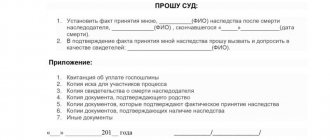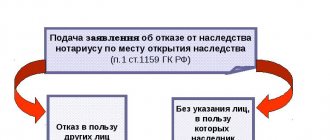Is it possible to revoke a refusal of inheritance before the expiration of 6 months?
Any heir can renounce the inheritance, regardless of the method of acquiring rights. The interested party only needs to submit an application to a notary.
The refusal may be:
- Addressable . The heir has the right to transfer his share to another person.
- Absolute. The assignee can simply abandon the property without specifying a beneficiary.
When submitting such documents, the notary explains to the heir the legal consequences of registering the document. Consequently, the heir clearly understands that by signing the application, he loses the possibility of its subsequent withdrawal (Article 1157 of the Civil Code of the Russian Federation).
Sample application for renunciation of inheritance
However, sometimes it happens that a statement is written under the influence of external factors or as a result of the lack of complete information about the inheritance.
But if the heir knew all the circumstances of the case, he would not renounce his property rights. An additional reason may be deception on the part of another heir, who promised compensation for part of the property that is due to the applicant.
Example. After the death of his father, an inheritance case was opened. The deceased citizen owned an apartment and a dacha. The deceased's wife used the property. The testator's son lived in another city. The deceased man's wife was not the young man's natural mother. The stepmother offered to settle all issues with paperwork. The stepson only had to write a refusal and wait until the woman filled out all the documents in her name, and then sold part of the property and returned his share to him. The application was sent by mail. As a result, the wife of the deceased citizen assumed her rights alone. However, after registration of ownership, she refused to pay the cost of the share of the property to the testator’s son. The direct heir of a deceased citizen was deceived.
Expert opinion
Stanislav Evseev
Lawyer. Experience 12 years. Specialization: civil, family, inheritance law.
As can be seen from the example, the classic deception scheme is built on trust between relatives. Such transactions are not protected by law. Because refusal of inheritance cannot be conditional.
Consequently, the heirs need to enter into property rights and only then decide on the redistribution of shares or pay compensation before the paperwork is completed. However, in this case the payer will not have any guarantees.
Is it possible to revoke a refusal? No. The law does not provide for the possibility of submitting a new application to a notary. The only way is a trial. An interested party may apply to have the transaction declared invalid.
Grounds for challenging a refusal
Although by law it is impossible to cancel a refusal of inheritance, the Civil Code of the Russian Federation still has some points that are allowed to be considered as grounds.
So, according to Art. 171 of the Civil Code of the Russian Federation, a document can be declared invalid due to its signing by a person with limited legal capacity. In Art. 178 describes a situation where a person has renounced the inheritance due to him due to a simple misunderstanding or deception. Such situations happen when more cunning heirs try to get rid of competitors without disclosing the composition of the inheritance, promising to pay money or give away part of the property after registration, taking on all the worries and documentation procedures.
In Art. 179 provides cases when heirs sign a waiver, fearing for their own health or life in the event of a certain form of harm to health, threats, etc.
If there is a specific circumstance, the potential heir will be able to go to court and challenge the previously made decision. But keep in mind that a simple story will not help if you do not attach evidence that is directly related to the situation.
How to cancel a refusal of inheritance
The renunciation of property rights is a unilateral transaction. Civil legislation provides for the possibility of invalidating such a transaction through the court.
Grounds for filing a claim
| No. | Reasons | Comments |
| 1 | The document does not comply with the legal form | The applicant’s signature is missing, his passport details are incorrect |
| 2 | The application was drawn up before the date of death of the testator | The right to a citizen’s property due to inheritance arises for a citizen only after the death of the owner. A refusal executed before the opening of the inheritance is void. |
| 3 | The document was written by an incapacitated or partially capable person | Only a fully capable person has the right to submit a refusal. Guardians act in the interests of incapacitated persons, and trustees act in the interests of persons with limited legal capacity. A prerequisite is the presence of consent to the waiver from the district guardianship department. |
| 4 | The waiver was drawn up by a minor or minor heir without the consent of legal representatives/guardians and/or the guardianship authority | A minor citizen cannot issue a refusal. A parent or guardian acts in his best interests. The minor submits the application independently. However, the consent of a legal representative is required. You will also need to submit permission from the district guardianship department. |
| 5 | The applicant was misled when submitting documents | Registration of refusal is a transaction. Therefore, all rules regarding the nullity and voidability of transactions apply to him. Misrepresentation is one of the reasons for declaring a transaction voidable. |
| 6 | The statement was written under the influence of threat, blackmail or deception | Similar to the previous point. The deal may be challenged in court. If committed under the influence of threats or blackmail. |
| 7 | The document was drawn up under unfavorable circumstances | If the successor was in a difficult situation, and another recipient took advantage of this, then the transaction can also be challenged. For example, a citizen needed to buy an expensive medicine, but did not have the funds. And another heir offered money for refusal. |
A court hearing can be initiated by the objector or another interested party whose rights are affected by the executed document.
Procedure and procedure
Submission of documents is carried out within 1 year from the date of registration of refusal of inheritance. For void transactions, the statute of limitations is 3 years .
Procedure:
- Collection of documentation . A receipt for payment of the state fee must be attached to the statement of claim. You also need to attach papers that substantiate and confirm the stated requirements. The lack of adequate evidence usually leads to a judgment against the plaintiff.
- Filing a claim . The document must comply with procedural rules and include information contained in the evidence.
- Submitting a claim to court. The heir must apply to the district court at the place where the inheritance case was opened.
- Trial. The trial takes place within the framework of claims proceedings. The defendant is the person who misled the successor.
- Obtaining a court decision . Based on the results of the hearing, the court makes one of 2 decisions - to satisfy or reject the claims. If the court satisfies the plaintiff’s demands, then the heir will subsequently need to visit the notary again. The purpose is to register an inheritance or transfer property rights to other relatives.
If the claim is satisfied, the plaintiff has the right to initiate a process to recognize the heir who misled him as unworthy. In such a situation, the defendant will be excluded from the inheritance.
Claim for invalidation of refusal of inheritance
The basis for starting a court hearing is a statement of claim. The document must contain the following information:
- name/address of the court to which the papers are filed;
- Full name, address of the plaintiff/defendant;
- data about third parties (notary, guardianship authority);
- the cost of the claim;
- document's name;
- main text of the statement;
- justification of the reasons for the invalidity of the document;
- the essence of the request;
- date, signature.
Also attached to the claim is a list of documents that are directly or indirectly related to the case.
Sample claim for invalidation of refusal of inheritance
Documentation
Without evidence, filing an application in court is useless. Therefore, the heir should take care in advance to prepare documents that directly or indirectly confirm the stated requirements. The list of papers depends on the situation in which the heir finds himself.
The basic package of documents includes:
- death certificate of a relative;
- will (if any);
- papers confirming the relationship of the plaintiff with the deceased citizen;
- a copy of the applicant's passport;
- act on the value of the inheritance;
- a certificate of deregistration of the deceased person;
- a copy of the refusal application;
- receipt for payment of the mandatory fee.
If the plaintiff acts through a representative, then an additional notarized power of attorney will be required.
Evidence options:
- Photo/video materials.
- Documents confirming the applicant's incapacity and a corresponding medical report.
- Information about the certification of the refusal application by an unauthorized notary.
- Testimony of witnesses in the case.
Expenses, cost
When filing a claim, the heirs must pay a state fee. Its size depends on the category of the case.
If the hearing takes place as part of a special proceeding, then the state fee is 300 rubles . This usually includes cases where the cause of the proceedings is the incompetent actions of a notary.
If the hearing is carried out as a claim proceeding, then the amount of the state duty will depend on the amount of the claim (Article 333.19 of the Tax Code of the Russian Federation).
For example, if the value of the property is from 20 to 100 thousand rubles, then the heir will have to pay 800 rubles. + 3% of the amount that exceeds 20,000. The minimum rate for property disputes cannot be lower than 400 rubles. The defendant in such cases is the person who, through his illegal actions, influenced the completion of the contested transaction.
Additional costs may be associated with conducting an examination, calling witnesses, or engaging a lawyer or lawyer. The cost of legal services depends on the region and the number of shipping days. Representing the interests of the plaintiff in the first instance court costs on average from 15 to 45,000 rubles.
What you should pay special attention to
Challenging a previously made decision occurs exclusively in court. This means that the parties are the plaintiff and the defendant. Accordingly, the case will not be considered in favor of the latter, because the refusal may be declared invalid, and the property mass may be redistributed by law or by will.
The third party may be a notary who is directly involved in the preparation of documentation for the renunciation of inheritance rights, which will clearly state that the applicant for the inheritance renounces his share in favor of specific citizens. The notary will have to explain under what circumstances the process took place, and also for what reason he did not specify the possible consequences, whether such an act was committed under the influence of threats, pressure, violence, etc.
It should be understood that the notary with whom the documentation was drawn up is a lawyer. It will not be easy to confront him in court on your own. And making a positive decision by the court is a complex process, requiring special knowledge and practical skills. In this regard, the help of a lawyer is extremely necessary. Only a true professional will be able to find the grounds and collect a sufficient documentary basis to resolve the conflict that has arisen.
Remember that independent attempts to defend the plaintiff’s rights under the law are a waste of time and effort.
Arbitrage practice
Going to court to invalidate a refusal of inheritance is a fairly common practice. Each applicant has his own reasons. If there is proper evidence, the courts satisfy the stated demands of the heirs who renounced their property rights.
Example. Citizen S. filed an application with the court to declare the refusal of inheritance invalid. The basis for the claim is the inability to understand the meaning of one’s actions and control them. The applicant explained that he lived in a residential apartment with his wife and her daughter. The property is jointly owned by these persons. After the death of his wife, the daughter began to prepare documents. Later she said that the deceased mother needed to be deregistered. This requires a notarized statement from the stepfather. The notary asked him about his intention to remove his wife from the register. He confirmed his desire and signed the document. It turned out that this was a refusal of inheritance. The plaintiff stated that he does not understand Russian well. He is Tatar by nationality. When signing a document at the notary, he copied Russian letters from a piece of paper that was provided to him. However, he did not plan to give up his property rights. A month later, his daughter arrived, for whom he was going to make a will. The same notary refused to register the document due to doubts about the testator’s legal capacity. Additionally, the man explained that he often experiences pressure changes, headaches, and memory loss. The examination confirmed that the man could not understand the meaning of his actions when signing the statement. The court satisfied the claims (Decision of the Osinnikovsky City Court of the Kemerovo Region dated August 30, 2012 in case No. 2-693).
Legislative norms
Legislative, including constitutional, norms consider the issue of succession in great detail. Thus, the Constitution of the Russian Federation in Part 4 of Art. 35 covers inheritance guarantees. Civil Code in Part 1 of Art. 1112 defines the content of the inheritance, which implies tangible property, and also includes the rights and obligations of its ownership.
Acceptance of an inheritance, along with the refusal procedure, is carried out after the will of the intended recipient (regardless of the method of transfer of the inheritance). This is also reflected in Chap. 64 Civil Code of Russia. There is also information about the possibility and consequences of claiming an inheritance by a failed heir due to his earlier refusal.
Let's consider whether and how to revoke a refusal of inheritance. Important points of Articles 1157—Civil Code:
- The decision must be announced within a six-month period and in the direction of specific individuals or without such a condition.
- Partial renunciation is only permissible if its transfer occurs on two or three grounds (by will/legal norms/in the process of transmission, etc.). Then the refusal may extend to a separate basis and the inherited property assigned to it.
- The refusal letter cannot be edited and is not returned to the applicant only on his initiative as invalid.
For succession or refusal of it, an individual is given a six-month deferment, starting after the death of the testator and from the moment the inheritance appears. In all cases, the clear result is the loss of rights to property, and therefore the legal grounds for its return.







